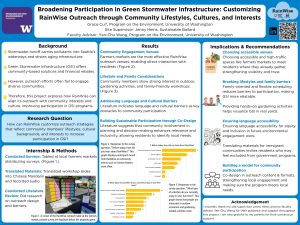Broadening Participation in Green Stormwater Infrastructure: Customizing RainWise Outreach through Community Lifestyles, Cultures, and Interests
Stormwater runoff pollution is a major environmental and public health issue in Seattle, accounting for approximately 30% of local water contamination. Pollutants such as oil, fertilizers, bacteria, and heavy metals flow from urban surfaces into waterways, threatening ecosystems and human health. The RainWise rebate program promotes the installation of green stormwater infrastructure (GSI) such as rain gardens and cisterns to mitigate the stormwater runoff impacts. However, the adoption of GSI remains limited, so there is a need for more effective community outreach. This study examines how RainWise can customize its outreach strategies to reflect community members’ lifestyles, culture, and interests to broaden participation in the GSI programs. The method includes attending tabling events at neighborhood farmers markets and summer festivals, collecting surveys, translating workshop materials into Chinese Mandarin, and conducting the literature review. Findings reveal that residents are most interested in outdoor, family-friendly, and gardening workshops, and that outreach through farmers markets is highly effective. Language barriers remain a challenge, but providing materials in multiple languages can significantly increase participation. This research also found that community participation in decision-making could make the community engagement work more effective and sustainable. Overall, aligning RainWise outreach with community lifestyle, culture, and interests can promote more inclusive engagement and strengthen adoption of green stormwater infrastructure.
